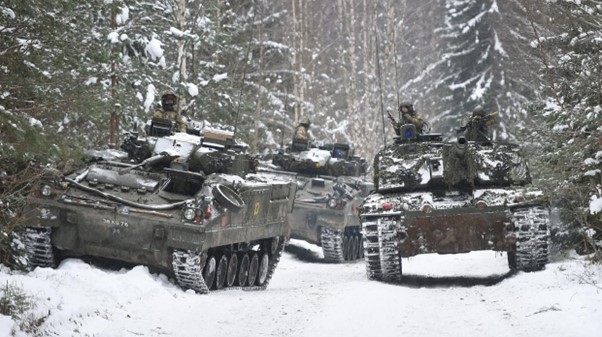
It served as an early symbol of the incompetence of the Russian military and the fighting spirit of the Ukrainian defenders. Commentators relished highlighting Russian flaws, gloating in the inadequacies of Putin’s military, and basking in the success of the Ukrainian Armed Forces.
What was less evident was any acknowledgment that orchestrating all the tools of war in an attack (Combined Arms Manoeuvre in the military jargon) is exceptionally difficult to do. There is no more complex or challenging endeavour that prosecuting a war; doing it well is incredibly hard. While there is no doubt that the Russians made a hash of their offensive, and have continued to look inept in the ensuing months, commentators would do well to pause to ask what it tells us about our own readiness (and that of our friends and allies) to fight this type of war.
My particular focus in this article is on the British military, but the themes hold true for our allies in NATO and beyond. Complacency and the seeming absence of existential threats has allowed successive governments to under-invest in Defence for twenty plus years (despite claims by ministers of real-term increases in spending). False choices have been presented during Defence reviews with talk between the Services of winners and losers: cutting the Navy to grow the Army, or vice versa etc. The real loser in these reviews has been the Defence of the realm and the winner has been our prospective adversaries.
It is great news that this Government has made an undertaking to spend 3% of GDP on Defence (still a good deal less than 30 years ago). However, what that will look like in practice given the state of the economy remains to be seen and the military has been so emasculated that the increase will be insufficient to allow the necessary rebuilding.
A few British Army snippets about why we should ask some searching questions of ourselves when observing the Russian failings.
There is plenty in here to be gloomy about and hard analysis is required about how the British Army would perform in high intensity warfare, but there are reasons to be optimistic too. The young men and women joining the Army are as good as ever. Innovation projects are underway to give meaning to the aspiration to prepare the Army for the Information Age. Moves are afoot to arm troops with the essential digital skills to allow them to fight with software as effectively as with their rifles.
This can only be done in partnership with industry, and specifically with disruptive tech start-ups who can enable a digital insurgency to fast-track the transformation of the fighting force. Luckily there is a small group of highly dynamic companies who genuinely care about national security who are committed to helping. Among them is WithYouWithMe, the Australian veteran-founded digital skills company, who are dedicated to helping address the crisis in digital skills in all of our countries. They are helping the American, Canadian, Australian and British militaries to identify their hidden digital talent and to give them the skills they need to excel on today’s battlefield and ensure that they can harness both old and new technology. Aptitude testing everyone as they enter service is vital to ensuring that the military harness the digital potential at their disposal.
The geo-political challenges facing Britain and her friends are significant and we can no longer afford the luxury of under-investing in national security. It would be complacent to conclude that Russia’s incompetence means that we are well-set. Instead it should act as a wake-up call that we must be honest about our own capability and work together to prepare a digitally-capable combat force to work alongside our allies.
Find out more about WithYouWithMe’s veteran program.